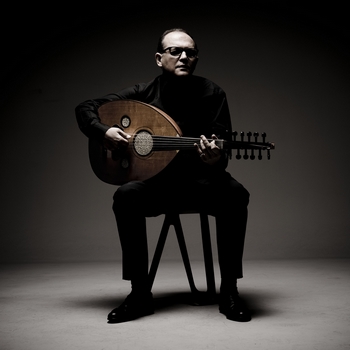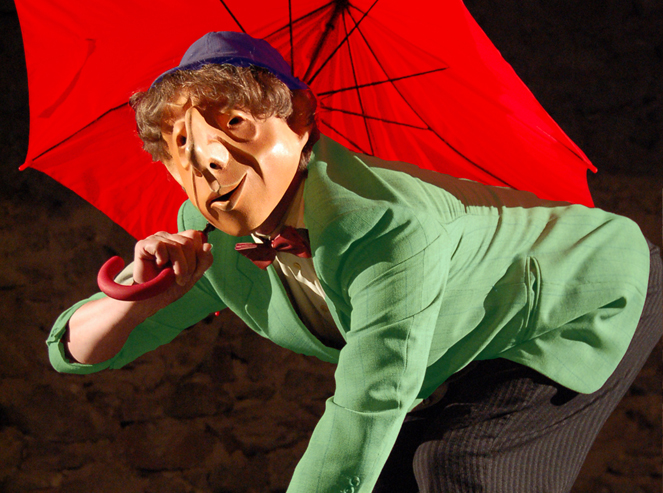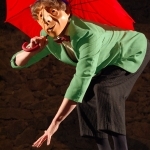contemporain
Boris Bronski

Présentation du spectacle
Humour - Mime, masques
Expressions multiples par des jeux de masques et de corps
Boris Bronski - Maitres des masques
De et avec Michael Aufenfehn, alias Meik de la Comédie des Masques
Boris Bronski est le « Monsieur Madame tout le monde », Il est le reflet de notre vie.
A travers des situations de la vie quotidienne, il est nous touche en plein coeur grâce à sa simplicité. C’est drôle, fantasque mais jamais banal
Masques et gestes se répondent dans un mélange merveilleux, à la fois drôle et tragique, entre comédie et tragédie.
Meik Aufenfehn, n’est pas seulement artiste sur scène, mais aussi dans les coulisses. Il est l’inventeur et le réalisateur des masques de Habbe & Meik, avec ses personnages fantasmés.
Un bijou du jeu de masques burlesque.
« Masques et gestes interfèrent de façon merveilleuse pour que vous ne sachiez plus si le geste est masque ou le masque est geste. » - Jury du Niederstätter surPrize
Auteur et Interprète
Boris Bronski : Michael AUFENFEHN
Mise en scène : Michael AUFENFEHN
Masques : Création et réalisation : Michael AUFENFEHN
Durée : 1h10 environ, sans entracte.
Dossier presse
Extraits de WAZ Westdeutsche Allgemeine et de WN Werdener Nachrichten
Michael Aufenfehn, une une première grandiose au Théâtre Catacombes.
'' Sur la scène, une fenêtre. Du 4e étage Boris Bronski observe les tomates de Mehmet. En face il y a la maison de Madame Schneider. Personne ne voit ce que voit Bronski, mais tout le monde rit quand il pousse maladroitement ses lunettes, tombe amoureux de son journal intime, ou bien se couche avec une rose. Bronski est sans travail et n'aurait strictement rien s'il n'y avait pas un chien, tombé tout droit du ciel. Meik Aufenfehn vient de porter avec brio son nouveau spectacle sur la scène de Catacombes.
Le programme suit un rythme à la fois détendu et excitant. Il offre un regard actuel sur les sentiments en dents de scie d'un amoureux qui attend sa belle en vain. C'est très drôle. On a l'impression qu'il y toujours plusieurs personnes sur la scène: l'acteur et sa marionnette, la personne à laquelle il téléphone, le mari dont il faut repasser le pantalon. Il croise les habitants de sa ville, des voisins, des voyageurs qui viennent, qui vont. Un jeu d'imagination presque sans limites.
Le courant passe immédiatement. Des sketches parlés alternent avec le jeu de masques. (Note de PB: en France, Meik ne joue pas cette scène parlée.) Les fameux masques, reconnaissables entre toutes, devenus célèbres grâce à Habbe et Meik, sont très expressifs. La bouche en diagonale rend un côté de visage gai, l'autre triste. Le message: la vie est à la fois drôle et tragique. Le mime bouge toujours avec vivacité, tantôt en l'air, tantôt au sol, toujours entre le ciel et la terre.
Il joue tellement vite que cela coupe le souffle. Le héros tombe, se redresse, grimpe et se s'étale à nouveau. Il se lève et tombe presque en même temps.Le sommet est le numéro de la femme de ménage qui se laisse aller complètement en écoutant une musique lascive et suivant les mouvements de son aspirateur.
Il est le musicien qui veut jouer du Bach, mais doit lutter contre un aspirateur. Ou un porteur aux prises avec une brouette de sacs qui se transforme en une couchette, une chaise ou une caisse de savon. Une beauté exotique se sert du corps de Meik Aufenfehn et danse en virtuose sur une musique qui lui va comme un gant.
Aufenfehn se délecte des possibilités offertes par le slapstick, l'acrobatie, les jeux de mots et la philosophie. A la fin, Bronski et son marionnettiste émeuvent le public: „Là où vous, les humains, vous avez le coeur, nous les marionnettes n'avons qu'un peu de coton de remplissage.
Des applaudissements frénétiques pour Bronski and Co.''
Extraits de L'Est-Eclair
''Applaudissements nourris pour les facéties de Boris Bronski.
La Compagnie allemande Meik a ouvert le bal avec son spectacle peuplé de curieux personnages aux masques étranges, Boris Bronski...
La salle est comble, petits et grands ont pris place dans le petit théâtre du festival pour se régaler pendant toute la semaine de spectacles vivants de grande qualité. Les lumières s'éteignent, le public retient son souffle, le festival est lancé.
Entre alors en scène un clown étonnant. Il porte des masques très expressifs dont la bouche en diagonale rend un côté du visage gai et l'autre triste. Le message est clair : la vie est à la fois drôle et tragique.
L'acteur joue tellement vite que le public en a le souffle coupé. Avec quelques accessoires basiques, des valises, une échelle, un diable, une canne… il enchaîne les gags et les acrobaties. Sans parole, mais soutenu par une bande-son très rythmée, le clown offre un jeu d'imagination presque sans limite. Il est seul sur scène, et pourtant les personnages s'enchaînent à un rythme endiablé donnant à voir au public tout un monde et de multiples personnages.
Poétique, loufoque, hilarant, effrayant, en un mot, clownesque, Boris Bronski visite tous les registres du spectacle vivant. Le public est sous le charme. Mention spéciale au voleur qui descend dans le public et crée l'espace d'un instant l'effroi chez les plus jeunes. Désopilant !''
Anouar Brahem English Page

Anouar Brahem Quartet - New program 2024
Anouar Brahem : oud
Klaus Gesing : bass clarinet, soprano saxophone
Björn Meyer : bass
Khaled Yassine : darbouka, bendir
For almost forty years and with a current discography spanning no less than 11 albums on the ECM label, Anouar Brahem has been constantly placing the age-old tradition of Arab music, whose emblem is his oud and its superb finesse, in different situations; not only does he set it in contrast against the free spirit and improvisation so typical of modern jazz, but also against the sophisticated harmonies of the erudite compositional tradition of the West and the refined forms of composition in other ancient cultural traditions from the Orient.
He has organized numerous cross-cultural encounters as well as juxtaposing different musical universes, thereby producing unsuspected potential in new but familiarsounding combinations, something which had never been done before. In 2009, he recorded "The Astounding Eyes of Rita", with a new group that included the soft melding of two sounds: the amazing fluidity of German-born Klaus Gesing on bass clarinet and the flowing notes on the bass guitar of Swedish-born Björn Meyer, to give a mixture of ascetic sophistication and sensuous lyricism so typical of oriental music, declined here by the music of the oud with its notes closely interwoven into the percussive background, played by Lebanese artist, Khaled Yassine. This group has had worldwide
success, both for its rich repertoire and the subtlety of the varied instrumentation, and now, ten years later, it is not only totally up-to-the-minute and more enduring and creative than ever, but Anouar Brahem had made a secret pact with himself never to look back and also vowed to renew his inspiration constantly by accompanying each new project with unusual orchestral combinations. So here, recognizing the lasting qualities of this group, he decided to add a new chapter to this story.
His main resource has been these years of shared experiences with the group, where their coherence and self-confidence has been increasing all the time. Anouar Brahem's new adventure puts his own terrain through the prism of this particular sound universe once again, daring to cast a backward glance at his whole career by mixing a few familiar compositions of the quartet with a scattering of older themes from other projects. This leads to further exploration of the orchestral possibilities of a decidedly unusual instrumentation whose origins lie in an extremely up-to-date kind of cross-cultural chamber music. Within this hugely expansive space, Anouar Brahem and his fellowmusicians
create a softly refined, graceful and dream-like world, borrowed as much
from the contemplative oriental tradition as from jazz. The resulting music, rigorously demanding and poetic, moves constantly between modesty and sensuality, nostalgia and contemplation: it is a magnificently intimate spiritual journey to the heart of sound.
The Astounding Eyes of Rita
Album September 2009, ECM
2019 marks the tenth anniversary of the album. And the interest of the audience is still there, as if it was the first year.
With :
Anouar Brahem: oud
Klaus Gesing: bass clarinet
Björn Meyer: bass
Khaled Yassine: darbouka, bendir
A delightful new assembled by Tunisian oud master Anouar Brahem.
The combination of the bass clarinet with the oud suggests a link to Anouar's Thimar trio, but this East/West line-up often feels closer to the more traditionally-inclined sounds of Barzakh or Conte de l'Incroyable Amour. Klaus Gesing, from Norma Winstone's Trio, and Björn Meyer, from Nik Bärtsch's Ronin, are both players with an affinity for musical sources beyond jazz, and they interact persuasively inside Brahem's music.
A dance of dark, warm sounds, urged onward by the darbouka and frame drum of Lebanese percussionist Khaled Yassine. The album is dedicated to the memory of Palestinian poet Mahmoud Darwish.
Souvenance
Music for oud
Album January 2015, ECM
This project is performed in 2 formations:
- the quartet
with Anouar Brahem (oud), François Couturier (piano), Klaus Gesing (bass clarinet ), Björn Meyer (bass)
- the quartet plus a string orchestra of 20 musicians
Probably Anouar Brahem has never gone so far into the balance between formal elegance and freedom of expression, lyricism and restraint, sensuality and asceticism, as he does here with this new repertoire which seems to ideally synthesize almost fifteen years of his personal and aesthetic quest for an authentic "common understanding" between Orient and Occident. Leading a brand-new Quartet, Brahem here revisits every facet of a musical universe that is at once melancholy and introspective in integrating his sensibilities and instrumental languageundeniably anchored in the Arab traditionwith the Impressionist, evanescent piano of colourist François Couturier, the pulsing sensuality of Björn Meyer's electric bass, and the misty, dreamlike, Nordic romanticism from the bass clarinet of Klaus Gesing.
As if to further emphasize the hybrid nature of his universe, here Brahem plunges his quartet for the first time into the sound-fabric of arrangements that are both sumptuous and minimalist, orchestrating a string-ensemble where the soloists (beginning with the melodic enchantments of the oud) are presented in an organic, voluptuous setting which is particularly stimulating. With ever more refinement in its melodic lines and at once contemplative and subtly narrative in its developments, the music contained in Souvenance possesses those qualities of self-evidence, naturalness and simplicity which are the hallmarks of works of genuine inspiration.
Other show already toured :
Blue Maqam
Album October 2017, ECM
Anouar Brahem: oud
Dave Holland: doublebass
Jack DeJohnette: drums
Django Bates: piano
Prestigious European tours in April 2018 and March 2019 :
Uppsala, Konsert & Kongress (Sweden) | Berlin, Boulez Saal (Germany) | London, Barbican (England) | Dublin, The National Concert Hall (Ireland) | Lyon, Auditorium (France) | Anvers, De Roma (Belgium) | Luxembourg, Philharmonic (Luxembourg) | Morges, Théâtre de Beausobre (Switzerland) | Köln, Kölner Philharmonic (Germany) | Paris, Paris Philharmonic (France) | Blagnac, Odyssud (France) | Zurich, Tonhalle (Germany) | Basel, Musical Theater (Switzerland) | Munich, Philharmoni (Germany) | Hamburg, Elbphilharmonic (Germany) | Lisbon, Gulbenkian Música (Portugal) | Brussels, Palais des Beaux-Arts (Belgium)
Biography
For almost forty years, Anouar Brahem, Tunisian composer and oud master, has been creating music both rooted in a highly sophisticated but ancestral culture and eminently contemporary in its global ambition. Anouar appears in many cross-cultural encounters, as well as developing entirely new links and similarities between styles and worlds whose potential closeness had never been considered until he discovered them. For him it was (and still is) a matter of highlighting the age-old Arab tradition of learned music, represented in its finesse by his oud, not only by confronting his instrument with modern jazz, but also with the sophisticated harmonies of the erudite compositional tradition of the West and refined forms from other ancient cultural traditions from the Orient.
His 11 albums on ECM, label acclaimed by the public and international critics alike (including Astrakan Café, Thimar, Le Pas du Chat Noir, Blue Maqams etc.), together with the triumphant success of his haunting music in concerts held in prestigious halls throughout the world, and his fellow-musicians including a remarkable selection of famous jazzmen such as Jan Gabarek, Dave Holland and jack DeJohnette are sufficient evidence to confirm Anouar's place as one of the most fascinating and inspirational artists in the current world of instrumental music.
His sensitive yet rigorous music constantly redefines a cleverly composite universe of poetry and culture, ever balancing between discretion and sensuality, nostalgia and contemplation.
Awards
De Klara's Classical Music Awards: "Best International CD - World" for Blue Maqams (Belgium, 2018)
Echo Jazz Award: "Best International Musician of the Year" for The Astounding Eyes of Rita (Germany, 2010)
Edison Award for Le Voyage de Sahar (The Netherlands, 2006)
Preis der Deutschen Schallplattenkritik (German Record Critics' Award) for Thimar (Germany, 1998)
National Music Award (Tunisia, 1985)
Reviews
The album is at once an extension and an audacious departure from the tradition of the oud. Despite his formidable knowledge of the maqarnat, an ornate system of modes that anchors Arabic music, he seldom bases his improvisations directly on the maqams. His phrasing is pure and uncluttered, expressing itself through silence nearly as often as sound. ... Composed of elegantly flowing lines and somber, breathlike silences, the music shimmers with the overtones of the piano. ... Mr. Brahem bases several of the tunes on spare, broken chords, repeated in the childlike manner of Satie. Simple though they are, however, they contain beguiling Arabesques. The three musicians rarely appear at once, performing as a trio on only seven of the album's 12 tracks. For the most part, you hear duets - piano and oud, oud and accordion, accordion and oud. The musicians often double each other's lines, but seldom in unison, which enhances the music's intimacy while producing a floating, echo effect.If every band projects "an image of coummunity," as the critic Greil Marcus once suggested, then Mr. Brahem's trio - part takht, part jazz trio, part chamber ensemble - evokes a kind of 21st century Andalusia, in which European and Arab sensibilities have merged so profoundly that the borders between them have dissolved. The image may be utopian, but its beauty is undeniable.
Adam Shatz, The New York Times
Throughout the record, the musicians maintain an exquisite balance and make only subtle changes in tempo or tone. Their sense of melancholy is so natural and comfortable it's childlike. On this tune, "Leila and the Land of the Carousel" a waltzing rhythm and revolving melody suggest a girl on that classic joyride...When he quit the oud for a while and played the piano instead, Anouar Brahem recovered his powers of musical myth-making. On this record, he creates a fairy tale setting and ultimately a storybook ending. The accordion lays down sustained chords like lengthening shadows in a forest. The piano conjures low-key sunlight and offers overtones of reconciliation. And in the arabesque path of "The Black Cat's Footsteps," Brahem finds a way back home to his beloved oud and to the songbird inside.
"All things considered", USA - National Public Radio
Son
Aucun son disponible pour cet artiste
Vidéo
Habbe & Meik
Boris Bronski
Habbe & Meik
Pipifaxen
Habbe & Meik
The Starsteps
Habbe & Meik
Pianissimo con furioso



















